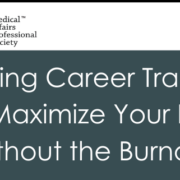Navigating Career Transitions: How to Maximize Your Impact – Without the Burnout
Explore the pitfalls of career transitions, and how to overcome them; look at the key foundations required to make a successful career transition; hear real-life stories, and learn actionable tips, from others who have navigated complex career transitions; explore why health & wellbeing should be a priority on your transition agenda

